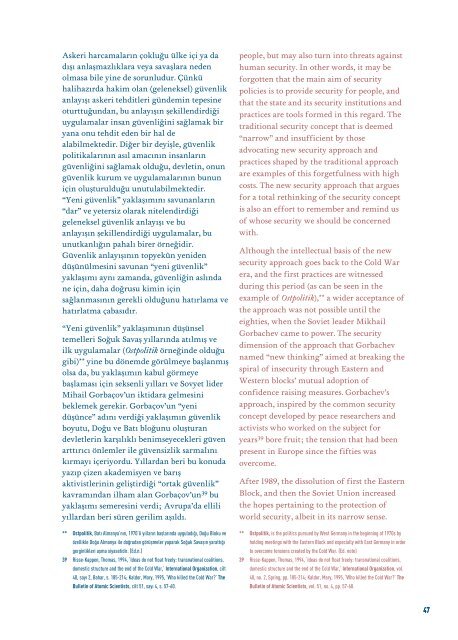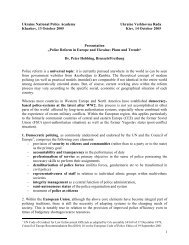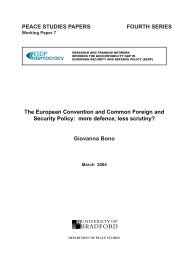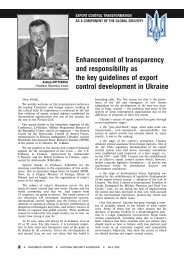Security Sector Governance: Turkey and Europe - DCAF
Security Sector Governance: Turkey and Europe - DCAF
Security Sector Governance: Turkey and Europe - DCAF
Create successful ePaper yourself
Turn your PDF publications into a flip-book with our unique Google optimized e-Paper software.
Askeri harcamalar›n çoklu¤u ülke içi ya da<br />
d›fl› anlaflmazl›klara veya savafllara neden<br />
olmasa bile yine de sorunludur. Çünkü<br />
halihaz›rda hakim olan (geleneksel) güvenlik<br />
anlay›fl› askeri tehditleri gündemin tepesine<br />
oturttu¤undan, bu anlay›fl›n flekillendirdi¤i<br />
uygulamalar insan güvenli¤ini sa¤lamak bir<br />
yana onu tehdit eden bir hal de<br />
alabilmektedir. Di¤er bir deyiflle, güvenlik<br />
politikalar›n›n as›l amac›n›n insanlar›n<br />
güvenli¤ini sa¤lamak oldu¤u, devletin, onun<br />
güvenlik kurum ve uygulamalar›n›n bunun<br />
için oluflturuldu¤u unutulabilmektedir.<br />
“Yeni güvenlik” yaklafl›m›n› savunanlar›n<br />
“dar” ve yetersiz olarak nitelendirdi¤i<br />
geleneksel güvenlik anlay›fl› ve bu<br />
anlay›fl›n flekillendirdi¤i uygulamalar, bu<br />
unutkanl›¤›n pahal› birer örne¤idir.<br />
Güvenlik anlay›fl›n›n topyekûn yeniden<br />
düflünülmesini savunan “yeni güvenlik”<br />
yaklafl›m› ayn› zam<strong>and</strong>a, güvenli¤in asl›nda<br />
ne için, daha do¤rusu kimin için<br />
sa¤lanmas›n›n gerekli oldu¤unu hat›rlama ve<br />
hat›rlatma çabas›d›r.<br />
“Yeni güvenlik” yaklafl›m›n›n düflünsel<br />
temelleri So¤uk Savafl y›llar›nda at›lm›fl ve<br />
ilk uygulamalar (Ostpolitik örne¤inde oldu¤u<br />
gibi)** yine bu dönemde görülmeye bafllanm›fl<br />
olsa da, bu yaklafl›m›n kabul görmeye<br />
bafllamas› için seksenli y›llar› ve Sovyet lider<br />
Mihail Gorbaçov’un iktidara gelmesini<br />
beklemek gerekir. Gorbaçov’un “yeni<br />
düflünce” ad›n› verdi¤i yaklafl›m›n güvenlik<br />
boyutu, Do¤u ve Bat› blo¤unu oluflturan<br />
devletlerin karfl›l›kl› benimseyecekleri güven<br />
artt›r›c› önlemler ile güvensizlik sarmal›n›<br />
k›rmay› içeriyordu. Y›llardan beri bu konuda<br />
yaz›p çizen akademisyen ve bar›fl<br />
aktivistlerinin gelifltirdi¤i “ortak güvenlik”<br />
kavram›ndan ilham alan Gorbaçov’un 39 bu<br />
yaklafl›m› semeresini verdi; Avrupa’da ellili<br />
y›llardan beri süren gerilim afl›ld›.<br />
** Ostpolitik, Bat› Almanya’n›n, 1970’li y›llar›n bafllar›nda uygulad›¤›, Do¤u Bloku ve<br />
özellikle Do¤u Almanya ile do¤rudan görüflmeler yaparak So¤uk Savafl›n yaratt›¤›<br />
gerginlikleri aflma siyasetidir. (Ed.n.)<br />
39 Risse-Kappen, Thomas, 1994, ‘Ideas do not float freely: transnational coalitions,<br />
domestic structure <strong>and</strong> the end of the Cold War,’ International Organization, cilt<br />
48, say› 2, Bahar, s. 185-214; Kaldor, Mary, 1995, ‘Who killed the Cold War?’ The<br />
Bulletin of Atomic Scientists, cilt 51, say› 4, s. 57-60.<br />
people, but may also turn into threats against<br />
human security. In other words, it may be<br />
forgotten that the main aim of security<br />
policies is to provide security for people, <strong>and</strong><br />
that the state <strong>and</strong> its security institutions <strong>and</strong><br />
practices are tools formed in this regard. The<br />
traditional security concept that is deemed<br />
“narrow” <strong>and</strong> insufficient by those<br />
advocating new security approach <strong>and</strong><br />
practices shaped by the traditional approach<br />
are examples of this forgetfulness with high<br />
costs. The new security approach that argues<br />
for a total rethinking of the security concept<br />
is also an effort to remember <strong>and</strong> remind us<br />
of whose security we should be concerned<br />
with.<br />
Although the intellectual basis of the new<br />
security approach goes back to the Cold War<br />
era, <strong>and</strong> the first practices are witnessed<br />
during this period (as can be seen in the<br />
example of Ostpolitik),** a wider acceptance of<br />
the approach was not possible until the<br />
eighties, when the Soviet leader Mikhail<br />
Gorbachev came to power. The security<br />
dimension of the approach that Gorbachev<br />
named “new thinking” aimed at breaking the<br />
spiral of insecurity through Eastern <strong>and</strong><br />
Western blocks’ mutual adoption of<br />
confidence raising measures. Gorbachev’s<br />
approach, inspired by the common security<br />
concept developed by peace researchers <strong>and</strong><br />
activists who worked on the subject for<br />
years39 bore fruit; the tension that had been<br />
present in <strong>Europe</strong> since the fifties was<br />
overcome.<br />
After 1989, the dissolution of first the Eastern<br />
Block, <strong>and</strong> then the Soviet Union increased<br />
the hopes pertaining to the protection of<br />
world security, albeit in its narrow sense.<br />
** Ostpolitik, is the politics pursued by West Germany in the beginning of 1970s by<br />
holding meetings with the Eastern Block <strong>and</strong> especially with East Germany in order<br />
to overcome tensions created by the Cold War. (Ed. note)<br />
39 Risse-Kappen, Thomas, 1994, ‘Ideas do not float freely: transnational coalitions,<br />
domestic structure <strong>and</strong> the end of the Cold War,’ International Organization, vol.<br />
48, no. 2, Spring, pp. 185-214; Kaldor, Mary, 1995, ‘Who killed the Cold War?’ The<br />
Bulletin of Atomic Scientists, vol. 51, no. 4, pp. 57-60.<br />
47

















